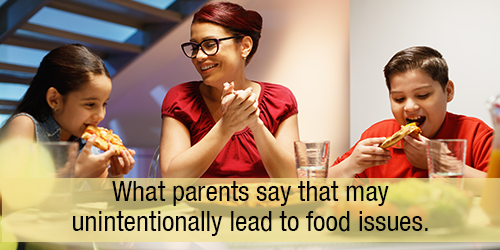In my work with my clients, our intention is to get to the root of their eating challenges. In the process, we often uncover messages they absorbed as children that affect their eating as adults. In this article, we’ll explore things parents say that may contribute to eating issues.
Let me first say, there is no need for blame (or guilt)! Caregivers are understandably concerned about making sure their children are well-nourished. They often don’t realize what they are saying about food, eating, and bodies may have unintended consequences.
Parents sometimes forget they’re raising adults, not children! One key life skill those adults need is the ability to navigate our food-abundant environment while maintaining optimal well-being. Therefore, the goal for parents is to provide children with the skills and increasing responsibility for managing their eating (and their lives) without constant vigilance.
9 Things Parents Say about Eating that Have Unintended Consequences
Here are nine things well-meaning parents might say that may have unintended consequences on children’s eating.
Reflect on whether some of these messages are affecting your eating today. If you care for young children, consider ideas for what you could say instead.
1. You are such a good eater!
Children want nothing more than to please their parents and other caregivers. While mealtime should be a pleasant time to connect with your children, eating should remain intrinsically driven to meet the child’s fuel needs, NOT to earn your praise. (Read You’re Not the Boss of My Body!)
What you could say instead:
- You must have been really hungry today!
- I love spending time with you while we have dinner.
2. You are such a picky eater!
All children (and most adults) have some foods they just don’t like. Some children are highly taste and/or texture sensitive and many of them will outgrow it. Selective eating is more likely to become an entrenched behavior when we berate, beg, bribe—or worse, feed kids only what they say they’ll eat.
(NOTE: If your child’s difficulties with eating lead to weight loss, stalled growth, nutritional deficiencies, or psychosocial issues, they may need to be evaluated for Avoidant Restrictive Food Intake Disorder (ARFID).)
What you could say instead:
- Yes, I remember you didn’t like it last time; tell me what you think today when you test one bite.
- Did you know your taste buds grow up just like you do? I wonder if you like this food yet.
3. Clean your plate; there are starving children in _______ .
Yes! There are starving children all over the world—and in your own area. Eating more food than you need doesn’t help them.
Avoid teaching children scarcity eating behaviors in an food-abundant environment.
What you could say instead:
- It’s important not to be wasteful, so please take only as much as you think you need.
- If you’re full, we can save the rest for later.
- Let’s collect canned food for the food drive and volunteer to help feed others.
4. You have to eat all your vegetables or there will be no dessert.
Kids are smart. When you bribe them to eat certain foods, they quickly realize those foods must be yucky—and that dessert is a special reward. They may also learn to hold out until a reward is offered.
What you could say instead:
- I love all kinds of different foods—some that make me healthy and strong and some that are mostly for fun. What kinds of foods do you like?
- Enjoy your dinner. We’ll be having dessert in a couple of hours.
5. Eat all your dinner or you don’t get dessert.
This variation on the threat above translates to “you must overeat so I will reward you by giving you more to eat!”
Children naturally love sweet foods, so they can learn to override their fullness signals especially when sweets are offered as a prize. As an adult, you may still clean your plate to justify eating the dessert you want.
What you could say instead:
- Save room for dessert tonight!
- Enjoy your dinner, including dessert!
6. You eat too much garbage (or junk food)!
Making foods “good” or “bad” leads to conflict and rebellion rather than choice and balance. Of course as parents, we are responsible for providing a variety of nourishing foods for our families, but labeling foods as junk or garbage can lead to shame and guilt. More important, when foods are “good” or “bad,” you may see yourself as good or bad depending on what you eat. Not helpful!
What you could say instead:
- Pizza night is Friday!
- Do you want to help me make tacos for dinner?
7. I was so bad at lunch today! Now I have to spend an extra hour on the treadmill.
Children are born to move! They naturally love exploring their environment, challenging themselves, learning new skills, and playing actively. Unfortunately, the messages they often get from adults teaches them that exercise is punishment for eating.
What you could say instead:
- I ate more than I needed and now I feel really full and uncomfortable. I think a walk will help me feel better. Want to join me?
- Anybody for a bike ride?!
8. I am so fat!
Kids learn from us even when we think they aren’t listening. Statements that imply “fat” is a bad thing to be, teach kids to judge themselves and others (leading to teasing and bullying on the playground).
What you could say instead:
- I’m not perfect and I don’t need to be.
- I do my best to make balanced choices so I feel my best.
9. I can’t believe ____ has gained so much weight!
Overhearing comments about other people’s bodies tells children it’s OK to judge others for their size or other physical attributes. Perhaps they also secretly wonder what you really think about them.
- There’s my friend! I haven’t seen her in such a long time!
- Every body is different—and they all deserve respect.
And, no matter what else you say, remember to say often: I love you just the way you are!

